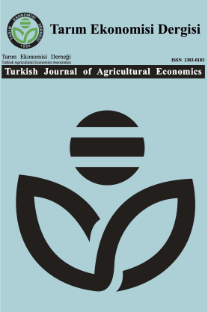Türkiye’de Organik Tarım Ürünlerinin Sertifikasyon Süreci ve Uygulamada Karşılaşılan Sorunlar
Organik tarım, , Sertifikasyon süreci, , Uygulama sorunları.
Certification Process of Organic Agricultural Products and Problems Experienced in the Implementation in Turkey
Organic agriculture , Certifikation process, , Aplication problems, ,
___
- Akın, S. Kara A. Pirinc V. and Ocal Kara F. (2014). The Effect of Organic Agricultural Producer Union, and The Source of Information and Technical-Economical Problems of Producers in Organic Agricultural (As an Example of Ilgın Village). XI. Ulusal Tarım Ekonomisi Kongresi (Sept 3-5, Samsun), 1622-1627 pp.
- Albersmeier, F. Schulze, H. and Spiller, A. (2009). Evaluation and Reliability of The Organic Certification System: Perceptions by Farmers in Latin America. Sustainable Development, 17: 311–324.
- Anonymous. 2017. Organik Tarım Kanunu. http://www.mevzuat.gov.tr/MevzuatMetin/1.5.5262-20100311.pdf Accessed: August 2017.
- Anonymous. 2017a. Organik Tarım Esasları ve Uygulanmasına İlişkin Yönetmelik. http://mevzuat.basbakanlik.gov.tr/Metin.Aspx?MevzuatKod=7.5.14217&Mevzuat İliski=0 Accessed: August 2017.
- Bayram, B. Yolcu, H. and Aksa, V. (2007). Organic Farming in Turkey and It’s Problems. Atatürk Üniversitesi Ziraat Fakültesi Dergisi, 38(2): 203-206.
- Berk, A. (2018). Factors Affecting The Exit from Farming of Young Farmers in Turkey: The Case of Nigde Province. Ciencia Rural, 48(8): 1-8.
- Cakır, A. Ergun, M. Ozbay, N. and Osmanoglu, A. (2015). Organic Safety. Doğu Karadeniz II. Organik Tarım Kongresi (October 6-9, Rize/Pazar), 223-233 pp.
- Demiryurek, K. (2011). The Concept of Organic Agriculture and Current Status of in The World and Turkey. Gazi Osmanpaşa Üniversitesi Ziraat Fakültesi Dergisi, 28(1): 27-36.
- George, C.K. 2001. Organic Spices, Handbook of Herbs and Spices. Woodhead Publishing in Food Science and Technology, Cambridge England, pp. 34-38.
- Kızılaslan, H. and Taner, L. (2011). Technical and Economical Problems of Producers in Organic and Conventional Greenhouse Vegetable Production (The Case of Sivas Province, Ulaş District). Gazi Osmanpaşa Üniversitesi, Ziraat Fakültesi Dergisi, 28(2): 135-143.
- Kup, F. Saglam, R. Yetkin, C. Tobi, I. and Uludag, A. (2013). The Stages of Organic Agriculture Applications and The Problems Encountered in Practice. 28. Ulusal Tarımsal Mekanizasyon Kongresi (September 4-6, Konya), 103-110 pp.
- Oelofse, M. Høgh-Jensen, H. Abreu, L.S. Almeida, G.F. Hui, Q.Y. Sultan, T. and Neergaard A. (2010). Certified Organic Agriculture in China and Brazil: Market Accessibility and Outcomes Following Adoption. Ecological Economics, 69: 1785–1793.
- ISSN: 1303-0183
- Yayın Aralığı: 2
- Başlangıç: 1992
- Yayıncı: Tarım Ekonomisi Dergisi
Türkiye’de Kırdan Kente Göç-İşsizlik: Todaro Paradoksu
Ahmet ŞAHİN, Erkan AKTAŞ, Sevgi TÜZÜN RAD
Çiftçilerin Girdi Temini ve Tarımsal Ürün Pazarlaması Konusundaki Yaklaşımları Üzerine Bir Araştırma
Onur TERZİ, M. Metin ARTUKOĞLU
Uluslararası Tarımsal Kalkınma Fonu ve Türkiye Uygulamalarının Değerlendirilmesi
Is There Any Link Between Cattle Milk Price and Beef Production? Empirical Evidence from Turkey
Kırsaldaki Kadınların Güçlendirilmesinde Üretici Pazarlamanın Rolü
Alaiddin KOŞAR, Sevgi Tüzün RAD
Türkiye’de Organik Tarım Ürünlerinin Sertifikasyon Süreci ve Uygulamada Karşılaşılan Sorunlar
NERMİN BAHŞİ, Dilruba ALTUNTAS ESERYEL, Dilek BOSTAN BUDAK
The Role of Producers’ Markets in Empowering Rural Women
Sevgi TÜZÜN RAD, Alaiddin KOŞAR
Sığır Sütü Fiyatı ile Sığır Eti Üretimi Arasında Bir Bağlantı Var mı? - Türkiye'den Ampirik Kanıtlar
Sığır Sütü Fiyatı le Sığır Et Üretimi Arasında Bir Bağlantı Var mı? Türkiye'den Amipirk Bulgular
